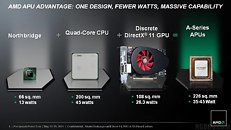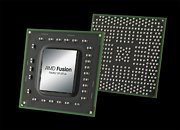Wednesday, November 23rd 2016

AMD "Llano" Securities Fraud Lawsuit Ongoing; Class Action Status Granted
As you may remember, "Llano" was somewhat of a disappointment for AMD, to put it mildly. Production issues with partner Global Foundries meant that Llano's roll-out was affected and extended beyond its predicted time-frame. This, in conjunction with other various factors, such as lack of product appeal over disappointing performance and the usual competition from Intel, forced AMD to pull in its second-generation "Trinity" APU too soon. By the time production finally caught up, it ended up overproducing relative to diminishing demand, which resulted in unsold inventory, thus forcing an inventory write-down of "Llano" chips valued at around $100 million. This reduced the company's worth by nearly that much overnight, and tanked the value of the AMD stock. This, of course, didn't sit well with investors.
The as-of-yet ongoing securities fraud lawsuit over AMD's "Llano" APUs has just achieved a milestone, in having been authorized by the Court to proceed as a class action. The Court's decision doesn't imply that the defendants (Rory P. Read, Thomas J. Seifert, Richard A. Bergman, and Dr. Lisa T. Su) did anything wrong. The defendants have not been ordered to pay any money, no settlement has been reached, no money is available as of now and there is no guarantee that there will be in the future.The lawsuit claims that investors suffered losses resulting from allegedly materially false and misleading statements Defendants made about the manufacturing and subsequent launch of, as well as the demand for, AMD's Llano microprocessor between April 4, 2011 and October 18, 2012, allegedly in violation of the Securities Exchange Act of 1934.
The Court decided that this lawsuit can proceed as a class action because it meets the requirements of Federal Rule of Civil Procedure 23, which governs class actions in federal district courts.In a class action, one or more people called "plaintiffs" sue on behalf of people who have similar claims. The Court must certify the action to proceed as a class action and appoint the "class representatives." All of the individuals and entities on whose behalf the class representatives are suing are known as "class members." Bringing a case as a class action allows the adjudication of many similar claims that might be economically too small to bring individually. One court resolves the issues in the case for all class members, except for those who choose to exclude themselves from the class.
The initial complaint in this action was filed January 15, 2014. After Arkansas Teacher Retirement System and KBC Asset Management NV were appointed as Lead Plaintiffs by the Court, they filed their Corrected Amended Class Action Complaint (the "Complaint") on June 11, 2014. Lead Plaintiffs allege that Defendants made materially false and misleading statements to investors about the manufacturing and subsequent launch of, as well as the demand for, its Llano microprocessor between April 4, 2011 and October 18, 2012, allegedly in violation of the Securities Exchange Act of 1934. Lead Plaintiffs further allege that the false and misleading statements inflated the price of AMD's common stock and that, when Defendants later disclosed the truth of the ongoing problems with Llano, AMD's stock price dropped. The Complaint, which contains all of the Lead Plaintiffs' allegations, is available here.
Defendants moved to dismiss the Complaint on July 7, 2014. On March 31, 2015, the Court issued an order denying Defendants' motion to dismiss.
On September 4, 2015, Lead Plaintiffs filed their motion for class certification. On March 16, 2016, the Court issued an order granting Lead Plaintiffs' motion, certifying the Class, appointing Lead Plaintiffs as "Class Representatives," and appointing Class Counsel.
The parties are currently engaged in discovery, and the deadline for completing discovery is March 3, 2017. The parties must file motions for summary judgment by April 7, 2017. No date for the trial has been scheduled.
Sources:
AMD Securities Litigation, Marketwatch
The as-of-yet ongoing securities fraud lawsuit over AMD's "Llano" APUs has just achieved a milestone, in having been authorized by the Court to proceed as a class action. The Court's decision doesn't imply that the defendants (Rory P. Read, Thomas J. Seifert, Richard A. Bergman, and Dr. Lisa T. Su) did anything wrong. The defendants have not been ordered to pay any money, no settlement has been reached, no money is available as of now and there is no guarantee that there will be in the future.The lawsuit claims that investors suffered losses resulting from allegedly materially false and misleading statements Defendants made about the manufacturing and subsequent launch of, as well as the demand for, AMD's Llano microprocessor between April 4, 2011 and October 18, 2012, allegedly in violation of the Securities Exchange Act of 1934.
The Court decided that this lawsuit can proceed as a class action because it meets the requirements of Federal Rule of Civil Procedure 23, which governs class actions in federal district courts.In a class action, one or more people called "plaintiffs" sue on behalf of people who have similar claims. The Court must certify the action to proceed as a class action and appoint the "class representatives." All of the individuals and entities on whose behalf the class representatives are suing are known as "class members." Bringing a case as a class action allows the adjudication of many similar claims that might be economically too small to bring individually. One court resolves the issues in the case for all class members, except for those who choose to exclude themselves from the class.
The initial complaint in this action was filed January 15, 2014. After Arkansas Teacher Retirement System and KBC Asset Management NV were appointed as Lead Plaintiffs by the Court, they filed their Corrected Amended Class Action Complaint (the "Complaint") on June 11, 2014. Lead Plaintiffs allege that Defendants made materially false and misleading statements to investors about the manufacturing and subsequent launch of, as well as the demand for, its Llano microprocessor between April 4, 2011 and October 18, 2012, allegedly in violation of the Securities Exchange Act of 1934. Lead Plaintiffs further allege that the false and misleading statements inflated the price of AMD's common stock and that, when Defendants later disclosed the truth of the ongoing problems with Llano, AMD's stock price dropped. The Complaint, which contains all of the Lead Plaintiffs' allegations, is available here.
Defendants moved to dismiss the Complaint on July 7, 2014. On March 31, 2015, the Court issued an order denying Defendants' motion to dismiss.
On September 4, 2015, Lead Plaintiffs filed their motion for class certification. On March 16, 2016, the Court issued an order granting Lead Plaintiffs' motion, certifying the Class, appointing Lead Plaintiffs as "Class Representatives," and appointing Class Counsel.
The parties are currently engaged in discovery, and the deadline for completing discovery is March 3, 2017. The parties must file motions for summary judgment by April 7, 2017. No date for the trial has been scheduled.



24 Comments on AMD "Llano" Securities Fraud Lawsuit Ongoing; Class Action Status Granted
If they continued to hold onto the stock I wonder if the current price would have given them a profit.
I'll be watching to see if this news has an effect on the current price of the stock.
shittynon-existent driver support? Call me surprised...wccftech.com/class-action-amd-llano-apu/Why is TPU reposting one and a half year old news??
The Arkansas Teacher should be suing KBC Asset Management.
www.theregister.co.uk/2015/04/01/amd_class_action_suit_greenlit/That is from April 1 2015 - the judge already approved the action last year??
Thats 18 months ago.
Emm,why has it suddenly become important to make a big headline in November 2016 for something that loads of the tech media reported on LAST year??
Slow news day??
From the article: "The lawsuit claims that investors suffered losses resulting from allegedly materially false and misleading statements Defendants made about the manufacturing and subsequent launch of, as well as the demand for, AMD's Llano microprocessor between April 4, 2011 and October 18, 2012, allegedly in violation of the Securities Exchange Act of 1934."
If the Plaintiffs can prove their case then it's going to cost AMD money in damages.
I love mine to this very day...although will agree about driver support. Especially video drivers. Pathetic at best.
Best Regards,
Liquid Cool
That said, what is reported is fact. I fail to see how this represents TPU smearing AMD's image, or "showing our true colors" - whatever that means. People should be critical enough to read the piece, and consider the implications on AMD's image. If they consider the usual profile of investors, this class-action lawsuit definitely paints AMD in better colors than its investors, who simply wanted to make a quick buck (not all of them, I posit, but most of them? Certainly). Also, if there's any fault with AMD on this case, it's simply less than stellar management on a difficult situation, with Global Foundries failing to deliver on AMD's timelines and strategy being the biggest issue here. But that's just my reasoning.
Claiming this place is biased, people have to be insane.
Much respect, thanks for the info.
The forums are mostly pro-nvidia, such that discussion of AMD GPUs is difficult with suffering from flames from all directions.
heck, even the news editor had a bias against AMD
Seriously, I have yet to see any evidence of what you claim outside of news threads, where everyone (and I mean everyone) gets bashed, NVIDIA, AMD, intel, or otherwise.
www.techpowerup.com/forums/threads/amd-radeon-gpus-limit-hdr-color-depth-to-8bpc-over-hdmi-2-0.227941
When TPU points a finger at AMD because HDMI sucks, you know there is a problem. TPU didn't used to be biased but, I'm seeing it get gradually worse as time progresses.
I built my first system in 1997 with an AMD 200Mhz CPU... atleast I think it was a K2 200.... hell thats been 20 years.... memory vades a bit in old age. But anyway I have used an AMD CPU in every system I have built up until 2013 and still would recommend them for those looking to save some cash. But I can't and will not accept the smoke and mirrors fiasco that has been going on for years now with them since Bulldozer was released. Phenom was decent but everything after that has been plain junk.
If AMD wants good solid press reviews about thier product then they need to produce something worthy of the Athlon 64 days.
There is every indication that they have grown into a stronger position with it's Global Foundries deal, and the Polaris release.
It is crucial that Zen and Vega are successful though, as this is the turning point for them after years of following their "Master Plan".
Competition drives innovation and better consumer prices. Why some people strive to defend their green, blue, or red prairies with such bravado is something I will never understand.